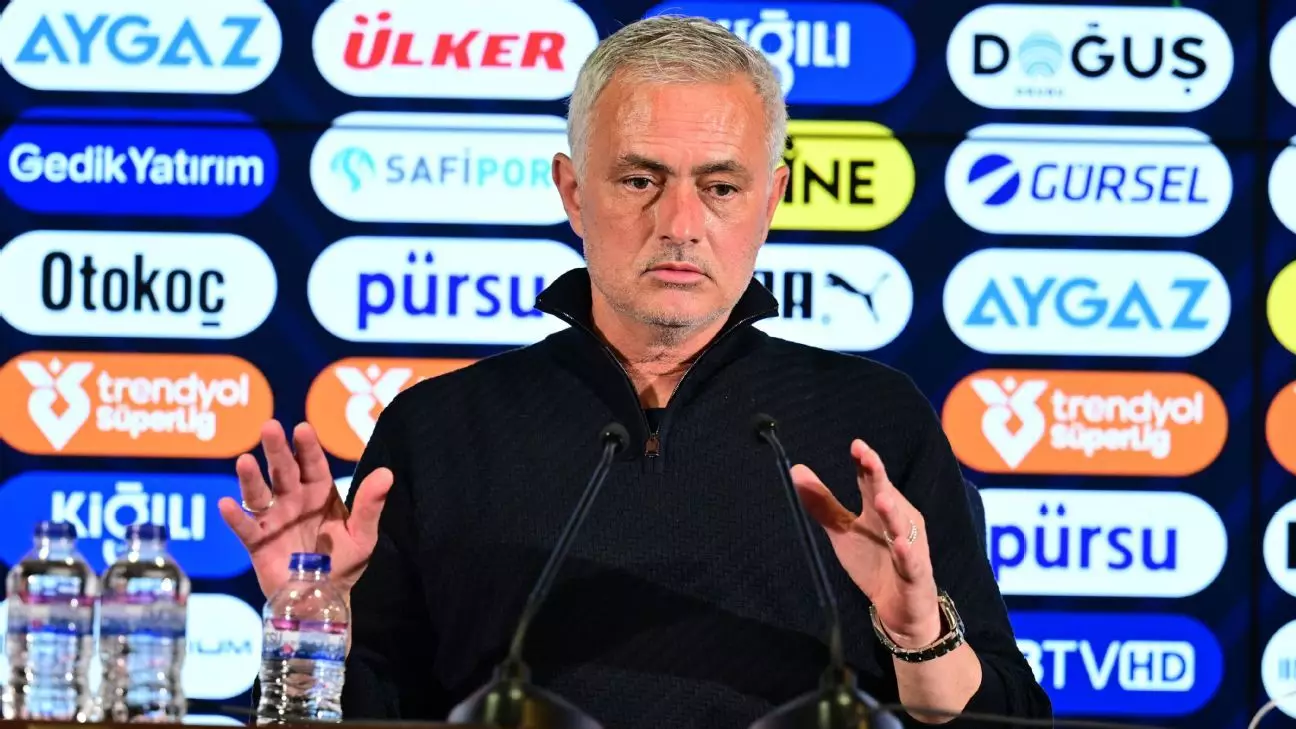José Mourinho, the renowned figure in football management, currently finds himself at a crossroads in his role as head coach of Fenerbahce. Following a disappointing 1-0 defeat against arch-rivals Besiktas, the scrutiny on his future escalates. Sitting second in the Super Lig, with Galatasaray leading the race by eight points and only four games left, the thrill of the chase for a league title—a feat Fenerbahce hasn’t achieved in a decade—now appears daunting. While his contract stipulates a two-year tenure, Mourinho’s reticence to address questions about next season reveals more than mere uncertainty; it reflects the challenging environment that permeates Turkish football.
Mourinho’s strategy has always involved creating a fortress around himself and his team, and this tendency is evident in his refusal to publicly discuss Fenerbahce’s future. “I’m not speaking about next season,” he stated emphatically after the match. This stance is not merely an act of defiance but underscores a commitment to maintaining focus on the present and protecting the club’s internal dynamics. Professional respect is vital in any organization, and Mourinho’s approach indicates he sees dialogue about his future as diverting from the immediate task at hand.
The Toxic Landscape of Turkish Football
One of the central themes in Mourinho’s discourse throughout the season has been what he labels as the “toxic” environment of the Super Lig. He has voiced concerns over perceived favoritism towards rivals, particularly Galatasaray, whose climb toward a potential third consecutive title has been marked by controversial officiating decisions. This sentiment portrays a broader frustration that resonates within the Fenerbahce fanbase, reflecting systemic issues that can overshadow positive performances.
Mourinho’s assertion, “One of the problems that Fenerbahce has is exactly the difficulty to cope mentally with the power of the system,” highlights the psychological toll the pressures of competition can exert on players. It encapsulates a struggle that transcends talent, where unseen factors can undermine collective morale. In high-stakes sports environments, the line between victory and failure often hinges on mental fortitude, making his acknowledgment of these pressures vital for understanding the current team dynamics.
Peer Dynamics and Community
When discussing the challenges faced by fellow managers, such as Ole Gunnar Solskjær at Besiktas, Mourinho’s humility comes to the forefront. Despite the backdrop of intense rivalry, he refrains from offering unsolicited advice, showing respect for Solskjær’s experiences. This interaction reflects the interconnectedness of football management, where each coach grapples with their unique challenges. For Mourinho, acknowledging the complexities of a fellow manager’s journey illustrates a sense of community amidst rivalry—an important quality that can foster respect rather than hostility within the sport.
Mourinho’s capacity to withstand criticism is also noteworthy. Following the derby defeat, he recognized that backlash from Fenerbahce supporters is part of the football culture. “It’s normal in this culture when results are not what people expect for there to be reactions,” he explained. Embracing accountability rather than shying away from it demonstrates the resilience required to navigate a turbulent managerial landscape.
The Path to Redemption
As he wrestles with the challenges posed by both the league structure and public expectations, Mourinho’s quest is not merely about achieving short-term success but rather establishing a foundation for sustainable growth within Fenerbahce. This endeavor requires a delicate balance—navigating the immediate pressure of results while laying the groundwork for future triumphs. His seasoned expertise in management and deep understanding of football culture will undoubtedly play crucial roles in defining his legacy at the club.
Ultimately, Mourinho stands at the hub of a larger narrative in Turkish football, where the fight against systemic challenges and the aspirations of Fenerbahce supporters intersect. Observing how he manages this complexity will serve as a testament to his prowess as a coach. In today’s competitive landscape, resilience isn’t just desirable—it’s essential for survival.


Leave a Reply